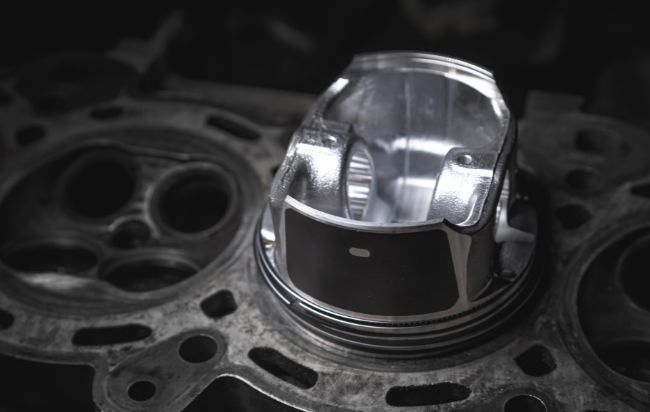
Power is needed to drive the transmission system and turn the wheels. Meanwhile, piston rings close off the combustion chamber housing the piston and assist with regulating oil pressure and the amount the engine uses. Damage to both the piston and piston rings often translates to decreased performance, as well as potential engine damage.
About Pistons and Piston Rings
Today, most pistons are made of an aluminum alloy and include several rings around the circumference. In terms of operation, piston rings help control the combustion process, directing the force through the piston rather than having it escape around the edges or help manage the oil, preventing it from getting burned with the gasoline.
As the combustion process unfolds, the piston helps close the combustion chamber as the air-fuel mixture gets compressed and ignites. The force created then pushes the piston back down. Attached to a connecting rod, the piston transfers the force to turn the crankshaft.
When everything is operating properly, the piston creates a close seal within the cylinder, which is achieved by the piston rings. Just as with all parts in your car, the piston and its rings both experience wear with time, which can affect the combustion process’s efficiency.
Issues with the Piston and Piston Rings
- Noise, resulting from an increased amount of space between the piston and cylinder wall, may sound like slapping as you’re driving.
- Exhaust smoke may seem excessive or appear blue or dark gray in color, perhaps with a burning smell. This occurs from oil getting into the combustion chamber.
- Consuming oil at a faster pace can also indicate oil is passing into the combustion chamber, where it’s burned with the gas. Chances are that your car needs an oil change before the 3,000 to 5,000-mile mark.
- Poor performance, particularly sluggish acceleration or losing power. This results from compression not creating the amount of force needed to power the transmission system.
- The check engine light turns on, indicating an issue with a cylinder and piston that’s starting to affect the car’s emissions.
These signs can stem from one of the following:
- A burned or melted piston, to the point you spot a hole in the aluminum.
- A cracked piston, resulting from the air-fuel mixture igniting at the wrong time.
- A scratched piston, often displaying lines or dents on the surface from debris getting trapped in the cylinder.
- Scuffs, a sign of insufficient lubrication between the piston and cylinder.
- A fully shattered piston, which can indicate the piston hit a valve and is permanently destroyed. This can also occur from the timing belt breaking, causing the piston and valve to collide.
Repairs to the Piston and Piston Rings
Piston damage can have catastrophic results, often with a domino effect. Whether from its own wear or related to the timing belt, a damaged piston often means a damaged cylinder, as well as piston rings, valves, the rod to the crankshaft and other parts within your engine.
Repairs begin with a series of tests examining the seal to the combustion chamber, the performance of the combustion process and any damage to the piston. If extensive damage occurred, your car may be totaled and your insurance carrier may discourage you from getting repairs. This depends on the car’s existing value and the amount of damage that occurred.
However, many of the above signs may also occur from piston ring damage. Although these parts can be replaced, the engine needs to be taken apart to remove the damaged rings and add a new set.
The technicians at DaSilva’s Auto Body can assess your car and recommend any repairs. To make an appointment, contact our Naugatuck shop today.

